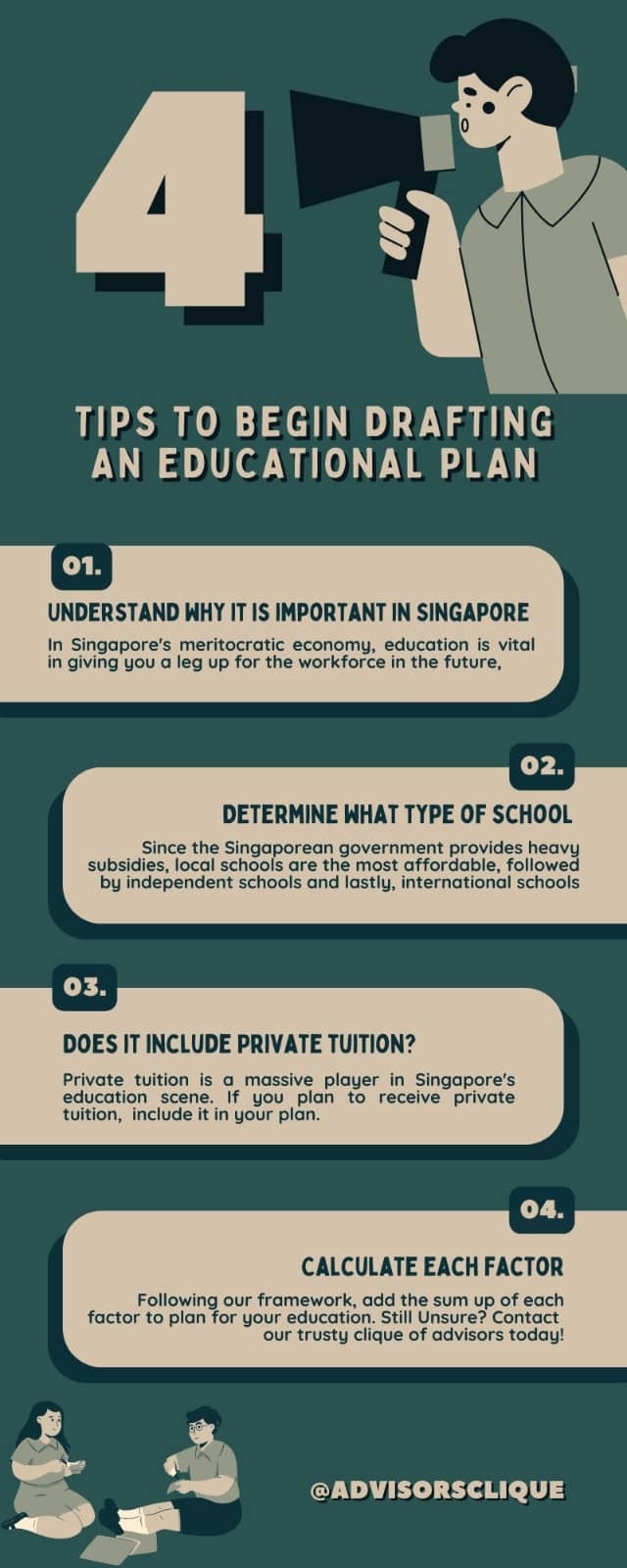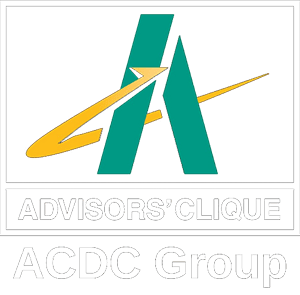The Important of Education Planning
As we go through life, our needs evolve.
Find out more about our Personal Insurance Services.
Share this article
Written by: Morris and Faith Mentor by: Yorick Kwek (Senior Financial Consultant, RNF: YKY300594769) Given Singapore’s emphasis on meritocracy, education becomes a significant predictor of income later in life. Educational planning is thus exceedingly important…
Written by: Morris and Faith
Mentor by: Yorick Kwek (Senior Financial Consultant, RNF: YKY300594769)
Given Singapore’s emphasis on meritocracy, education becomes a significant predictor of income later in life. Educational planning is thus exceedingly important in ensuring that one does not lose out on the academic rat race. Hence, in Singapore, to start planning early would also be to secure a stable income in the future.
In case of an unforeseen accident that reduces your income-earning ability, will you be able too afford the same level of education for yourself or your children? Therefore, planning early is vital to ensure that such obstacles do not roadblock your education.
The most prominent factors when drafting an education plan are the type of school one plans to attend and the amount of tuition fees incurred.
Type of School
Singapore students have a choice between three main types of school – government schools, independent schools, and international schools.
Due to the government’s emphasis on education, heavy subsidies are provided for all local schools. Despite this, school fees still vary based on secondary school types. Government Secondary school fees starts from SGD25 whereas international schools which are not subsidised can cost up to a few thousand a month depends on each individual school. Table below shows the estimated school fees based on monthly basis.
| Type of School | Estimated School Fees |
|---|---|
| Government Aided Secondary School 1 | SGD25 – 43 / month |
| Specialised Independent School 1 | SGD300 – 600 / month |
| International School (eg. Year 6 in Australian International School) | SGD3,500 / month 2 |
The difference between the type of pre-University education is less prominent. Below tables shows the estimated school fees base on the type of pre-university education.
| Type of School / Education | Estimated School Fees |
|---|---|
| Government Aided Junior College3 | SGD33 / month |
| Independent Junior College3 | SGD300 – 600 / month |
| Local Polytechnics3 | SGD3,000 / year |
| Private Diploma (eg. SIM Global Education)4 | 11,770 / course |
The most significant expenses is one’s university fees. Calculating the cost of university varies largely based on where one chooses to study. As a local student, the school fees in local university are usually heavily subsidies by our government as compared to an overseas university. The table below shows a comparison between a local university and an overseas university school fees for an individual to study in the Bachelor of Science field.
| Type of School | Estimated School Fees |
|---|---|
| NTU (Bachelor of Science in Chemistry and Biology Chemistry) | SGD33,7005 |
| The University of Melbourne (Bachelor of Science) | AUD138,972 – AUD176,3526 |
If most students attend university between 18 to 24 years old, sound educational planning from an early stage is vital to avoid acquiring massive student debt before they even join the workforce.
Tuition Fees Incurred
In Singapore, the multi-billion dollar private tuition industry puts pressure on parents to send their children for private tuition on top of regular school. Because of the heavy subsidies provided by the government for regular school fees, private tuition fees are especially significant when drafting out an educational plan. According to MoneySmart, 4 out of 5 parents send their children for tuition and spend between SGD112 to SGD2,000 per month just on tuition . As private tutor provides 1-1 tuition, the cost per session is generally more expensive as compared to tuition centre. Currently, the rate for private tutor ranges from between SGD30-100/hour which can cost from SGD120-400/month for just 1 subject. However, the price still varies as it depends on the tutor experience and whether the tutor is a MOE ex-teacher7. Coupled with the fact that most students attend tuition for multiple subjects the cost of private tuition is likely to well exceed the cost of regular school fees which is why it’s vital to include the tuition expenses into the education plan.
How to go about planning
A large variety of factors has to be considered and taken into account as they will impact how one goes about planning for their children’s education. Factors such as:
- Location
- Is the school within the proximity of your house?
- Budget
- The type of school (eg., Government / Independent / International)
- Type of Post-Secondary Education (e.g., JC / Polytechnic / ITE / Private Diploma)
- Type of Tertiary Education (e.g., Local University / Private University / Oversea Studies)
- Tuition cost
- Transportation Cost
According to MAS8, it projected the inflation for this year to be between 3-4% instead of the usual 2-3%. Considering the fact that, the economy is unstable due to the situation in other countries and pandemic, it is crucial to take the inflation rate into consideration when planning for child education. Taking in the average of 2.5% inflation rate per annual, a NTU Bachelor of Science in Chemistry and Biology Chemistry which cost est. SDG33,700 in today’s value, will cost 50% more in 20 years’ time.
The next step will be to determine the annual cash flow, and the steps or actions required to attain the target figure. This requires more planning in regards to the number of years you have to achieve your target, for example, a much longer time frame would be required if you have lower than expected income and vice versa. Annual cash flow can also be adjusted depending on your expenses, taxes, and income growth, all of which ultimately will have a deciding impact on the number of years you will be required to save and set aside a certain sum of money.
Lastly, it is also key that you find a fund that is able to reap returns that exceed the Annual Inflation Rate of about 2-3%. This is important as, if the rate of the returns is less than that of the Annual Inflation Rate, you will be essentially losing your savings annually, and would be required to set aside an even greater amount of money annually as compared to what you have previously calculated.

1https://www.singsaver.com.sg/blog/school-fees-singapore
2https://www.ais.com.sg/admissions/elementary-and-secondary-fees/
3https://www.moe.gov.sg/financial-matters/fees
4https://www.sim.edu.sg/degrees-diplomas/programmes/programme-listing/diploma-in-banking-and-finance#fees-and-financial-aid
5https://www.ntu.edu.sg/admissions/undergraduate/financial-matters/tuition-fees/accepted-programme-offer-in-tf2022
6https://study.unimelb.edu.au/find/courses/undergraduate/bachelor-of-science/fees/
7https://blog.moneysmart.sg/family/best-tuition-centres-singapore/
8https://www.channelnewsasia.com/singapore/mas-tighten-monetary-policy-analysts-2810031
